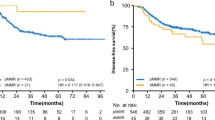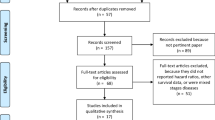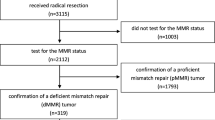Abstract
Defective DNA mismatch repair (MMR) occurs in approximately 15% of sporadic colorectal cancers (CRCs). Multiple retrospective studies have shown that patients with MMR-deficient CRCs have a more favorable stage-adjusted prognosis compared with those who have MMR-proficient tumors. Evidence also indicates that patients with MMR-deficient colon cancers do not benefit from treatment with adjuvant 5-fluorouracil chemotherapy. Furthermore, recent studies, including a pooled analysis, have validated the prognostic and predictive impact of MMR status in patients with stage II and III colon cancer who were treated in adjuvant chemotherapy trials. Given these data, it can be recommended that MMR status be determined and used to inform clinical decision-making for adjuvant chemotherapy in patients with stage II colon cancer.
This is a preview of subscription content, access via your institution
Access options
Subscribe to this journal
Receive 12 print issues and online access
$209.00 per year
only $17.42 per issue
Buy this article
- Purchase on Springer Link
- Instant access to full article PDF
Prices may be subject to local taxes which are calculated during checkout

Similar content being viewed by others
References
Ionov, Y., Peinado, M. A., Malkhosyan, S., Shibata, D. & Perucho, M. Ubiquitous somatic mutations in simple repeated sequences reveal a new mechanism for colonic carcinogenesis. Nature 363, 558–561 (1993).
Poynter, J. N. et al. Molecular characterization of MSI-H colorectal cancer by MLHI promoter methylation, immunohistochemistry, and mismatch repair germline mutation screening. Cancer Epidemiol. Biomarkers Prev. 17, 3208–3215 (2008).
Piñol, V. et al. Accuracy of revised Bethesda guidelines, microsatellite instability, and immunohistochemistry for the identification of patients with hereditary nonpolyposis colorectal cancer. JAMA 293, 1986–1994 (2005).
Toyota, M. et al. CpG island methylator phenotype in colorectal cancer. Proc. Natl Acad. Sci. USA 96, 8681–8686 (1999).
Thibodeau, S. N., Bren, G. & Schaid, D. Microsatellite instability in cancer of the proximal colon. Science (New York, NY) 260, 816–819 (1993).
Jass, J. R. et al. Morphology of sporadic colorectal cancer with DNA replication errors. Gut 42, 673–679 (1998).
Lindor, N. M. et al. Immunohistochemistry versus microsatellite instability testing in phenotyping colorectal tumors. J. Clin. Oncol. 20, 1043–1048 (2002).
Boland, C. R. et al. A National Cancer Institute workshop on microsatellite instability for cancer detection and familial predisposition: development of international criteria for the determination of microsatellite instability in colorectal cancer. Cancer Res. 58, 5248–5257 (1998).
Herman, J. G. et al. Incidence and functional consequences of hMLH1 promoter hypermethylation in colorectal carcinoma. Proc. Natl Acad. Sci. USA 95, 6870–6875 (1998).
Sinicrope, F. A. et al. Prognostic impact of microsatellite instability and DNA ploidy in human colon carcinoma patients. Gastroenterology 131, 729–737 (2006).
Gafà, R. et al. Sporadic colorectal adenocarcinomas with high-frequency microsatellite instability. Cancer 89, 2025–2037 (2000).
Halling, K. C. et al. Microsatellite instability and 8p allelic imbalance in stage B2 and C colorectal cancers. J. Natl Cancer Inst. 91, 1295–1303 (1999).
Lanza, G. et al. Immunohistochemical test for MLH1 and MSH2 expression predicts clinical outcome in stage II and III colorectal cancer patients. J. Clin. Oncol. 24, 2359–2367 (2006).
Samowitz, W. S. et al. Microsatellite instability in sporadic colon cancer is associated with an improved prognosis at the population level. Cancer Epidemiol. Biomarkers Prev. 10, 917–923 (2001).
Popat, S., Hubner, R. & Houlston, R. S. Systematic review of microsatellite instability and colorectal cancer prognosis. J. Clin. Oncol. 23, 609–618 (2005).
Kerr, D. J. et al. A quantitative multigene RT-PCR assay for prediction of recurrence in stage II colon cancer: selection of the genes in four large studies and results of the independent, prospectively designed QUASAR validation study [abstract]. J. Clin. Oncol. 27 (Suppl. 15S), a4000 (2009).
Lamberti, C. et al. Microsatellite instability did not predict individual survival of unselected patients with colorectal cancer. Int. J. Colorectal Dis. 22, 145–152 (2007).
Kim, G. P. et al. Prognostic and predictive roles of high-degree microsatellite instability in colon cancer: a National Cancer Institute-National Surgical Adjuvant Breast and Bowel Project Collaborative Study. J. Clin. Oncol. 25, 767–772 (2007).
Benatti, P. et al. Microsatellite instability and colorectal cancer prognosis. Clin. Cancer Res. 11, 8332–8340 (2005).
Ribic, C. M. et al. Tumor microsatellite-instability status as a predictor of benefit from fluorouracil-based adjuvant chemotherapy for colon cancer. N. Engl. J. Med. 349, 247–257 (2003).
Jover, R. et al. The efficacy of adjuvant chemotherapy with 5-fluorouracil in colorectal cancer depends on the mismatch repair status. Eur. J. Cancer 45, 365–373 (2009).
Carethers, J. M. et al. Mismatch repair proficiency and in vitro response to 5-fluorouracil. Gastroenterology 117, 123–131 (1999).
Arnold, C. N., Goel, A. & Boland, C. R. Role of hMLH1 promoter hypermethylation in drug resistance to 5-fluorouracil in colorectal cancer cell lines. Int. J. Cancer 106, 66–73 (2003).
Hemminki, A., Mecklin, J. P., Jarvinen, H., Aaltonen, L. A. & Joensuu, H. Microsatellite instability is a favorable prognostic indicator in patients with colorectal cancer receiving chemotherapy. Gastroenterology 119, 921–928 (2000).
Elsaleh, H. et al. Association of tumour site and sex with survival benefit from adjuvant chemotherapy in colorectal cancer. Lancet 3 55, 1745–1750 (2000).
Sargent, D. J. et al. Confirmation of deficient mismatch repair (dMMR) as a predictive marker for lack of benefit from 5-FU based chemotherapy in stage II and III colon cancer (CC): A pooled molecular reanalysis of randomized chemotherapy trials [abstract]. J. Clin. Oncol. 26 (Suppl.), a4008 (2008).
Bertagnolli, M. M. et al. Microsatellite instability predicts improved response to adjuvant therapy with irinotecan, fluorouracil, and leucovorin in stage III colon cancer: Cancer and Leukemia Group B Protocol 89803. J. Clin. Oncol. 27, 1814–1821 (2009).
Tejpar, S. B. et al. Microsatellite instability (MSI) in stage II and III colon cancer treated with 5FU-LV or 5FU-LV and irinotecan (PETACC 3-EORTC 40993-SAKK 60/00 trial) [abstract]. J. Clin. Oncol. 27 (Suppl. 15S), a4001 (2009).
Saltz, L. B. et al. Irinotecan fluorouracil plus leucovorin is not superior to fluorouracil plus leucovorin alone as adjuvant treatment for stage III colon cancer: results of CALGB 89803. J. Clin. Oncol. 25, 3456–3461 (2007).
de Gramont, A. et al. Oxaliplatin/5FU/LV in adjuvant colon cancer: Updated efficacy results of the MOSAIC trial, including survival, with a medial follow-up of six years. J. Clin. Oncol. 25 (Suppl. 18S), a4007 (2007).
Saltz, L. B. et al. Bevacizumab in combination with oxaliplatin-based chemotherapy as first-line therapy in metastatic colorectal cancer: a randomized phase III study. J. Clin. Oncol. 26, 2013–2019 (2008).
Sinicrope, F. A. et al. Model-based prediction of defective DNA mismatch repair using clinicopathological variables in sporadic colon cancer patients. Cancer (in press).
Barrow, E., McMahon, R., Evans, D. G., Levine, E. & Hill, J. Cost analysis of biomarker testing for mismatch repair deficiency in node-positive colorectal cancer. Br. J. Surg. 95, 868–875 (2008).
Deng, G. et al. BRAF mutation is frequently present in sporadic colorectal cancer with methylated hMLH1, but not in hereditary nonpolyposis colorectal cancer. Clin. Cancer Res. 10, 191–195 (2004).
Domingo, E. et al. BRAF screening as a low-cost effective strategy for simplifying HNPCC genetic testing. J. Med. Genet. 41, 664–668 (2004).
Author information
Authors and Affiliations
Ethics declarations
Competing interests
The author declares no competing financial interests.
Rights and permissions
About this article
Cite this article
Sinicrope, F. DNA mismatch repair and adjuvant chemotherapy in sporadic colon cancer. Nat Rev Clin Oncol 7, 174–177 (2010). https://doi.org/10.1038/nrclinonc.2009.235
Issue Date:
DOI: https://doi.org/10.1038/nrclinonc.2009.235
This article is cited by
-
The role of diagnostic, prognostic, and predictive biomarkers in the management of early pancreatic cancer
Journal of Cancer Research and Clinical Oncology (2023)
-
Complete pathological response of colorectal peritoneal metastases in Lynch syndrome after immunotherapy case report: is a paradigm shift in cytoreductive surgery needed?
BMC Gastroenterology (2022)
-
A mismatch repair-deficient and HPV-negative anorectal squamous cell carcinoma
Virchows Archiv (2019)
-
Expending Role of Microsatellite Instability in Diagnosis and Treatment of Colorectal Cancers
Journal of Gastrointestinal Cancer (2017)
-
Cancer predisposition genes: molecular mechanisms and clinical impact on personalized cancer care: examples of Lynch and HBOC syndromes
Acta Pharmacologica Sinica (2016)



